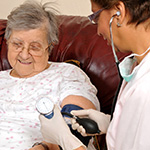
Family Needs
Ask the patient, not the doctor.
Yiddish Proverb
The Center for Jewish End of Life Care connects you with information and resources you need to provide the best care for your family member. If you are the patient, you can guide your family caregivers toward the information they need, so they can support you in the way you need.
Jewish tradition offers: “It is not good for man to be alone” (Genesis 2.18). Jewish traditions across the spectrum of observance emphasize the importance of building enduring partnerships. These caregiving relationships may be with spouses, partners, parents, children, siblings and relatives. These lasting relationships may also be with people freely chosen as family.
-
Family as Caregiver
When a family member faces a terminal or life-limiting illness, particularly when a patient enrolls in a hospice program, families are often deeply engaged as caretakers.
Our patients may be children, and their parents and caregivers are trying to meet the needs of their young siblings. Other caregivers are adult children caring for two parents with chronic illnesses or in different stages of need. Family members may be serving as caregivers for the first time; other caregivers may have been providing support for decades. In many cases, however, caregiving responsibilities change after an admission to a hospice program. And in most cases, the role as caregiver continues to evolve over the remainder of the patient’s life.
When children are part of the family system, you may wish to find a hospice program that provides support specifically geared for these youngest family members. For example, MJHS Hospice and Palliative Care offers a creative arts therapy program. Art & Soul™ Creative Arts Therapy employs specially trained child life specialists as well as licensed music and art therapists to help meet the psychological and emotional needs of children facing the loss of a parent, grandparent or sibling.
There are many useful resources available to family caregivers. See our resources section for those we have found most helpful.
-
Where Can Caregivers Go for Support?
Many hospice programs offer caregiver support groups to families and friends whose loved ones are facing life-limiting and advanced illnesses. These groups provide an opportunity to take a break and meet with other caregivers, to share information and to offer encouragement. These groups meet in-person, online and through teleconferences and are often offered alongside core hospice services. There are often disease specific caregiver support groups, such as support groups for Alzheimer’s or cancer, though general caregiver support resources exist as well.
The demands and stress of providing care for a family member at the end of life can be daunting – even overwhelming. A strong supportive-care network can help caregivers discover moments of mindfulness to breathe, recharge and refocus attention to self-care, and to take a pause from the responsibilities of being a family caregiver.
Helpguide.org has useful tips and reminders to manage and prevent caregiver stress and burnout.
The Next Step in Care website offers family caregivers a number of resources for understanding and supporting a loved one’s medical issues. Their guides include: Advance Directives, Hospice and Palliative Care, and The First Step In Care: Becoming a Family Caregiver. Their guide on family involvement in doctors’ visits is particularly helpful to family members who need information from medical professionals in order to best help their relatives determine their next steps in care. The guides are available in English, Russian, Spanish and Chinese.
On March 5, 2014 The Washington Post published “Caregiving: A Special Report,” with articles, videos and resources about the special force of silent heroes caring for America’s aging population. A must read for anyone who is/will/has cared for an older loved one.
-
Respite Care
There may come a time during the course of a family member’s illness that caregivers need some time away from the tasks of caregiving. Caregiver stress may lead to physical and emotional distress that can interfere with the ability to provide care. Respite care provides the break that caregivers often need.
Respite care programs are designed to provide temporary, short-term assistance in caring for an individual of any age who has special needs. It is intended to allow the caregivers to take some time away from the patient, and even the patient some time away from caregivers, to allow all parties to emotionally recharge and become better prepared to handle the typical day-to-day challenges of providing care in the face of a terminal or life-limiting illness.
Note on coverage for Respite Care
Medicare will only cover respite care delivered at a Medicare-certified inpatient hospice facility or at a contracted Medicare-certified hospital or a skilled nursing facility that has the capability to provide 24-hour nursing if the patient’s plan of care requires 24-hour nursing intervention. It is important to be aware that Medicare will not cover respite level of care in the patient’s private residence or at an Assisted Living Facility. For other considerations and restrictions, please see the NHPCO Respite Consumer Guide or discuss with a social worker or hospice care team member.Resources from the National Hospice and Palliative Care Organization (NHPCO):
-
What Can I Do Now?
If you and your family members have had conversations about hospice care, you may be left wondering, “What now?” It is now time to help the patient live life to the fullest for whatever time remains.
This may involve bringing family members to visit with the patient, offering tastes of favorite foods, watching favorite movies, and listening to songs from the past. Often the patient’s greatest desire is to continue living as fully as possible for as long as possible. Knowing who your loved ones have been throughout their life is key to helping affirm them in their remaining days.
Some patients and families find comfort in reciting Tehillim – reading chapters from the book of Psalms – at the bedside. At the bedside of critically ill patients, family and community members may offer variations of Mi Sheberakh (the prayers for recovery), or the patient may request to recite a Viddui (final confession). This confession can be offered by the patient or on the patient’s behalf by family members, a rabbi, chaplain or volunteer.
Other people find singing soothing songs and melodies or offering gentle touch can provide both the patient and the family with a sense of intimacy and comfort. Some have shared that these moments of wordless presence make an enormous difference in decreasing the patient’s pain and agitation and increasing the family’s calm and comfort.
Useful External Links:
For patients to recite:
- Viddui/Confession Text in Hebrew and English
- The Viddui available for download at The Bay Area Jewish Healing Center begins with an additional prayer for forgiveness
- When Death Seems Near, a High Holiday meditation, is available for download as a PDF from the Bay Area Jewish Healing Center
-
Bereavement
Death of a loved one does not end the physical, spiritual and emotional burden for families and those closest to them. Grief and loss can impact lives long after a loved one has died. Hospice providers offer bereavement education and support to family members at no cost for a minimum of twelve months after the death of a loved one. This assistance often includes:
- Individual or family supportive counseling for family members of all ages
- Ongoing support groups specific to the type of loss experienced
- Memorial services of remembrance
- Educational seminars on coping with loss
- Referrals to community resources that may benefit you
Resources from the National Hospice and Palliative Care Organization (NHPCO):





